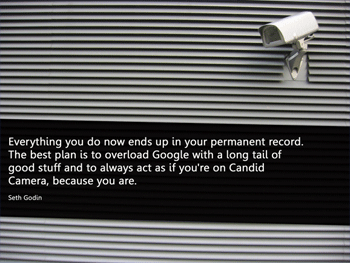If you work as a freelancer or other type of solopreneur where you market your products and services based on your name (rather than a company name), your name is your brand. What people think when they see or hear your name will influence whether or not they do business with you. That’s why independent professionals need to be aware of brand marketing as it applies not just to products or corporate images, but as it applies to them. We call it “personal branding.”
Why is Personal Branding Important?
Personal branding is especially important for the solopreneurs of the world because their name conjures up a certain image with customers or prospective customers. That means every time you post to a blog, interact with others on a social network, contribute to a forum, or even send an email, people are going to form an opinion about you and associate your name with that image. If you fall into that group, you want your name to convey a positive image — to generate immediate trust. Does yours? Let’s look at an example.
Let’s say you’re a writer and you specialize in writing online sales letters. How you choose to promote your brand (your name) can have serious implications for your career. For example, you might decide to charge $50 per sales letter (knowing that good sales letter writers usually charge several hundred to several thousand). You’ve basically chosen to market your services primarily on price (never a good idea for service marketing, but that’s another topic for another time).
By promoting your services in that way, your personal brand becomes one of “the cheap guy.” That’s not a great image to build in any kind of business writing. “Cheap” in that market comes with a built in lack of trust (not to mention that it hinders your ability to earn anywhere near an industry standard income).

Becoming “the cheap guy” could lead to worse branding issues down the road. People who undercharge for services generally take on a lot of projects. They have to if they want to earn enough to get by comfortably. That, in turn, often leads to burnout. The person (in this case a writer) has to overload their schedule. If that’s done consistently for a while, they’ll start to miss all of their deadlines, forget about projects altogether, or run into other problems. That “cheap guy” brand image might just become “the unreliable guy.” Remember, word spreads.
On the other hand, you could build an image for yourself (and your name) as a responsible and respectable professional who commands higher rates. Ask yourself “if I could afford to hire any copywriter to write my sales letter, who would it be?” The name you answered (assuming you’ve heard of any sales copywriters) has a strong personal brand. How did they build it?
Brand Marketing Tips for Building a Strong Personal Brand
That writer you thought of is probably pretty successful. Most of the top sales letter writers probably don’t even have an opening to take on new work right away because the demand is so great. Wouldn’t you love to be in their shoes, able to pick and choose your projects, have waiting lists, be able to turn down work regularly, etc.? It’s a nice feeling. But how do you get there?
You build your personal brand, and you become a trusted name in your industry!
In this example, the writer may have done any number of things. Chances are good that they have their own website (after all, if they can’t sell themselves online, why would anyone hire them to sell their products and services for them?). Maybe they have a blog where they position themselves as a thought leader in the copywriting field. It’s also likely that they’ve published at least one book. They probably have one or more mailing lists and newsletters. They might even have a subscription site, speak at seminars, or offer online courses.
They go beyond practicing their craft — they also teach it. They become authorities in the field.
Education as a Personal Brand Builder
People love it when you share your knowledge and teach them more about what you do. It shows them that you know what you’re talking about. It gives them a better feel for your style. It also makes them respect your work a little more. Let me explain.
I used to be a PR consultant before becoming a full-time writer. I specialized in online PR. A service with a quickly growing demand at the time was press release writing for online syndication (combining good old PR with SEO benefits). While demand was growing, I found that a lot of online business owners really didn’t understand news releases and how to use them. So I taught them. When they had questions, I answered them. I blogged about them. I wrote and sold an e-book teaching them how to write their own.
Over time I released another version of that e-book — this time for free. It included a marketing message (similar to marketing white papers) promoting my services. Essentially, I was teaching my prospective clients the basics of doing what I do for them. People downloaded it, and better yet they put it to use.
“Why is that good?” you might be wondering. “Didn’t you lose money?” Actually I made more money! Here’s why:
The people who downloaded my e-book broke into three primary categories: those who wrote their own press releases and were satisfied, those who wrote their own press releases but weren’t satisfied, and those who either tried or just read about writing their own press releases but decided there was more to it than they originally thought.
Members of group one may not have ultimately hired me to write their press releases. But they did remember me when they needed other PR consulting or writing work done. They also passed my name along to others who did hire me (referrals are the lifeblood of many successful solopreneurs).
Several people in group two decided that since they weren’t happy with the results from their own press release, they’d hire a pro next time (me in this case) and compare the results. Several of them have turned into long-term clients.
Those in group three should be your favorite. They’re the ones who originally might have thought your work was easy. After they learn more about it, they have a new appreciation for what you do, and that’s a great start to any business relationship. They’ll be the most likely group to hire you. Basically, your free information reminds them that time is money and that their time is better spent on something other than trying to master your job.
Giving away knowledge doesn’t make you less marketable. If anything, the opposite is true. And it works for any type of independent professional! Give it a try. Share your knowledge openly in online communities or in consultations. Release informational products in your niche or industry (free or paid). Show people that they can trust you, that you’re worth hiring, and that you can get the job done! Those are the things you want associated with your personal brand as a solopreneur. If you need help coming up with specific ideas for how you can showcase your industry knowledge when marketing your personal brand, check out our article on how business freebies can help you land more sales for more examples of information-sharing tactics.
Beyond the Basics of Personal Branding
Personal branding goes far beyond your selling points. It’s not just about putting information out there that you want to be associated with your professional brand. It’s also about keeping other, less appropriate, information at bay. Remember that your name is probably associated with more than just your business on the Web.
If you have personal social networking accounts, you might want to consider keeping that information private if the personal information you talk about could tarnish your personal brand (for instance, if you like to brag about your drunken flings on Facebook, you probably don’t want your potential clients seeing that).
Think about personal branding this way: When someone searches for you online, what will they find? What does it say about you? By all means, be authentic. It’s a part of building trust with your target market. But there’s a difference between being authentic and leaving yourself completely exposed. Know your limits. Know your comfort level. And most importantly, know what is and isn’t “TMI” for your own target market.
Now get out there and start building your personal brand!
